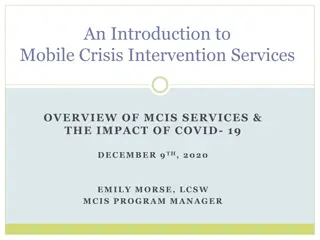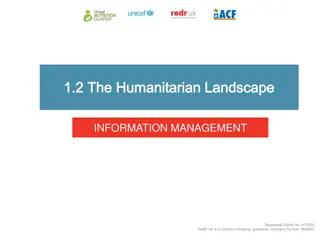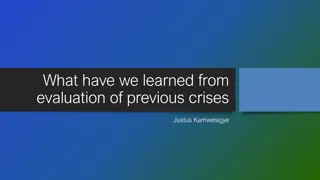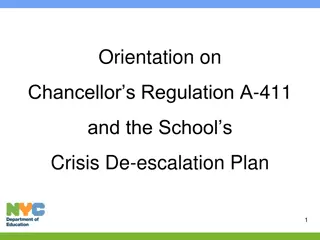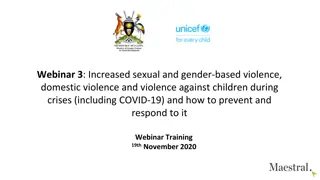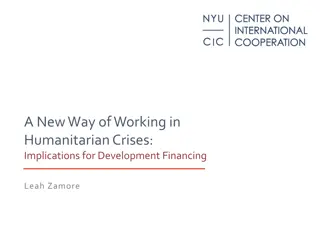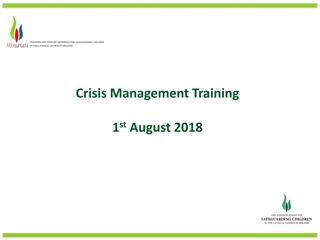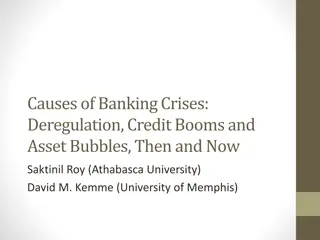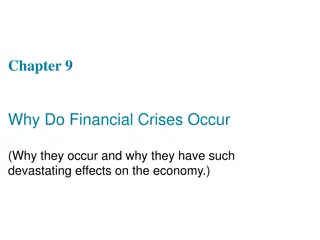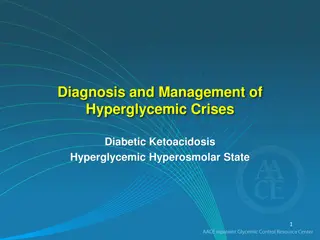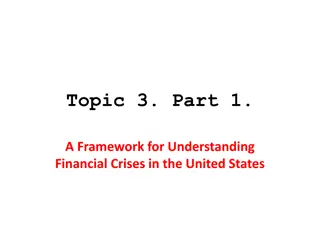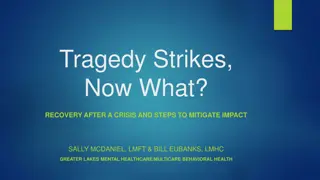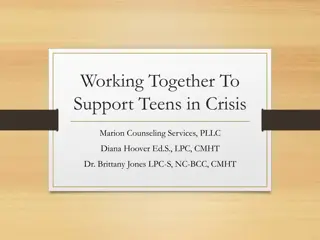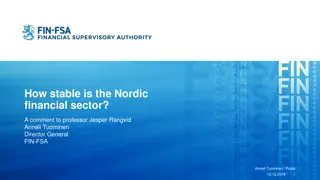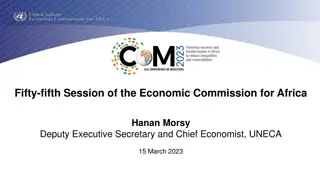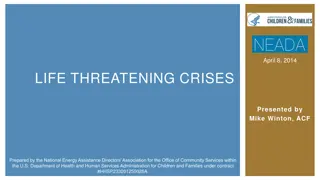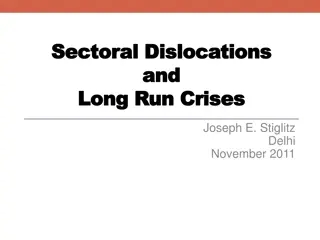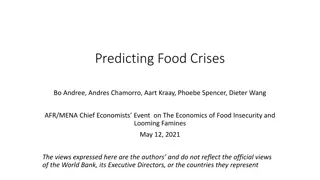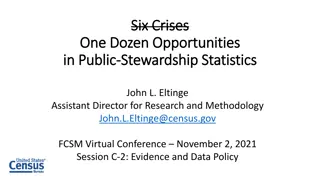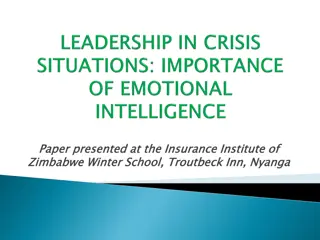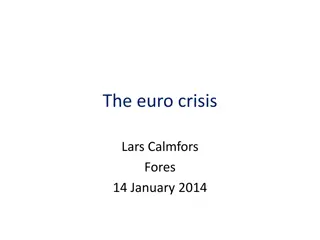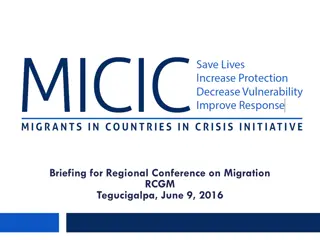Disaster Management and Local Development Through Devolution
The presentation outlined the importance of disaster management in the context of achieving sustainable local development through devolution. It emphasized the need for effective subnational planning, mainstreaming of disaster risk reduction, and financing for disaster relief. The concept of devolut
5 views • 21 slides
Understanding Sickle Cell Disease Pain Management
Sickle cell disease (SCD) patients often experience vaso-occlusive crises (VOC) causing acute pain, a hallmark symptom of the disease. Pain management is crucial in healthcare interactions for these patients, with chronic pain also being a significant concern due to organ/tissue damage. Research sho
1 views • 18 slides
Overview of Mobile Crisis Intervention Services and the Impact of COVID-19
Mobile Crisis Intervention Services (MCIS) in Connecticut provides crisis stabilization and hospital diversion for youth experiencing behavioral and mental health crises. Available for ages 0-17 and 18-year-olds in high school, MCIS offers intervention, referrals, and support to prevent future crise
0 views • 17 slides
Understanding Humanitarian Landscape and Coordination Challenges
The humanitarian landscape involves various organizations working together to provide assistance during crises. Coordination challenges, such as identifying needs, existing assistance, and government involvement, have been prevalent. The Inter-Agency Standing Committee (IASC) was established in 1991
1 views • 21 slides
Insights from Evaluation of Previous Humanitarian Crises and Core Humanitarian Standards
Evaluation of past crises reveals the importance of core humanitarian standards in providing timely, coordinated, and effective assistance. Learning from experience, feedback mechanisms, and competent staff are key for addressing humanitarian crises. Data and systems play a crucial role in monitorin
0 views • 13 slides
School Crisis De-escalation Strategies and Plans
Schools in New York City are committed to maintaining safe and orderly environments for effective teaching and learning. Establishing Crisis Intervention Teams and completing Crisis De-escalation Plans are essential. De-escalation strategies involve identifying crises, assessing strengths and weakne
0 views • 31 slides
Business Continuity SOP and User Guide Overview
This document provides an overview of the Business Continuity Standard Operating Procedures (SOP) and User Guide, aimed at assisting individuals in handling crises effectively. It includes sections on immediate response, review agendas, press release, staff briefing, and specific guidance on handlin
0 views • 58 slides
Economic Crises Faced by Weimar Republic, 1919-1933
The Weimar Republic encountered significant economic challenges between 1919 and 1933, leading to chaos and a surge in extremist support. Major crises included hyperinflation in 1923 and the devastating global Depression starting in 1929. The Treaty of Versailles imposed reparations on Germany, whic
0 views • 24 slides
Understanding and Addressing Increased Violence During Crises: Webinar Insights
Exploring the escalation of sexual and gender-based violence, domestic violence, and violence against children during crises like COVID-19, this webinar provides strategies to prevent and respond effectively. Participants are guided on identifying risks, taking actionable steps, and fostering a safe
0 views • 26 slides
Management Strategies for Crisis in Tourism Industry
Explore the crucial role of crisis management in the tourism sector, understanding how internal and external shocks impact the industry. Discover the ripple effects of crises on a global scale and delve into various approaches to studying and managing crises effectively. Gain insights into the lifec
0 views • 9 slides
Innovative Approaches in Humanitarian Crises and Development Financing
This study explores the New Way of Working in humanitarian crises, focusing on reinforcing national systems, anticipating crises, and transcending humanitarian-development divides. Promising trends include rising government ownership and increased linkages between humanitarian activities and governm
0 views • 6 slides
Emergency Management and Continuity Planning at ECU
Emergency management and continuity planning play crucial roles at East Carolina University (ECU), ensuring the protection of the university's mission and operations during crises. This includes creating frameworks to reduce vulnerability to hazards, cope with disasters, and maintain operational con
0 views • 40 slides
Crisis Management Training - Aims and Strategies Discussion
Explore the essentials of crisis management training focusing on identifying current crises, crafting response strategies, and studying practical cases. Understand the concept of crisis management, its relevance to child safeguarding, and engage in group discussions on handling crises effectively. D
0 views • 26 slides
Analysis of Banking Crises: Deregulation, Credit Booms, and Global Impacts
This study delves into the causes and patterns of banking crises, focusing on deregulation, credit booms, and asset bubbles. It compares the global financial crisis of 2008-2009 with historical crises worldwide, highlighting common factors leading to such events. The research discusses the role of l
0 views • 23 slides
Understanding Financial Crises and Their Impacts
Financial crises arise due to disruptions in financial markets, leading to severe economic consequences. This text delves into the definition, stages, causes, and effects of financial crises, with a focus on the global financial crisis of 2007-2009 and the European Sovereign Debt Crisis. It also dis
0 views • 28 slides
Understanding and Managing Hyperglycemic Crises: DKA and HHS
Hyperglycemic crises such as Diabetic Ketoacidosis (DKA) and Hyperglycemic Hyperosmolar State (HHS) are life-threatening emergencies characterized by severe hyperglycemia and metabolic imbalances. DKA involves absolute or near-absolute insulin deficiency leading to ketone body production and systemi
0 views • 82 slides
Impacts of Financial Crises on Gender Disparities in Risk-Taking and Labor Markets
Exploring the effects of financial crises on gender differences in risk-taking behavior, labor market outcomes, and the disproportionate impact on individuals based on income and gender. Insights into how men and women respond to crisis signals and the potential implications for future economic tren
0 views • 18 slides
Understanding Financial Crises in the United States: A Comprehensive Analysis
This framework explores the ideologies, interests, and institutions influencing financial crises in the US. It discusses the complexities of legislative responses, the impact of ideological transitions, and the role of political power and policy stickiness in shaping outcomes.
0 views • 16 slides
Financial Crises and Solutions in European History
Explore the financial crises in European history, their resolution or failed solutions, and the factors contributing to the worldwide economic downfall after WWI. Discover how the United States played a significant role, the impact of the Dawes Plan, and the consequences of investing and banking fai
0 views • 12 slides
Gender Equality in Humanitarian Crises: Empowering Women and Girls
Addressing gender equality in humanitarian crises is crucial for empowering women and girls. Access and participation in facilities and activities, meaningful participation, dignity, and empowerment are key aspects to consider. Women's empowerment spans various spheres and requires holistic approach
0 views • 33 slides
Steps to Recovery and Mitigating the Impact After a Crisis
Schools face various crises that can significantly impact the mental and physical well-being of students and educators. It is crucial to understand the nature of a crisis, have a comprehensive crisis management plan, and respond effectively to minimize harm. Long-term mental health needs must also b
0 views • 26 slides
Supporting Teens in Crisis: Marion Counseling Services
Understanding crises that teens may face and how Marion Counseling Services can provide support. Discussion on types of crises, development, experiences during crisis, signs of depression, available resources, and local/national helplines for immediate assistance.
0 views • 9 slides
Challenges and Opportunities for Democracy's Future
Exploring the current crises facing democracy, this content highlights key challenges such as racial and income inequality, systemic racism, money in politics, low voter participation, polarization, corruption, and structural issues. It also addresses current crises like the pandemic, economic reces
0 views • 7 slides
Challenges of Eurozone Integration on Europe's Competitiveness
The integration of Eurozone has brought about various crises, including financial, debt, political, and competitiveness crises. The use of a single currency with uniform interest rates has led to imbalances and political stalemates within the Eurozone. High debt levels among Eurozone countries, part
0 views • 21 slides
Overview of Nordic Financial Sector Stability
The stability of the Nordic financial sector has been examined in relation to past crises and indicators like rapid credit growth and house prices. While the current situation seems stable, risks remain, especially with low interest rates impacting households and banks. Lessons from the 2008 crisis
0 views • 8 slides
Perspectives on Engagement between Adults in Suicidal Crises and Mental Health Nurses
Patients in suicidal crises perceive their interactions with mental health nurses as crucial for feeling nurtured, safe, and supported. The study explores how compassionate engagement aids in alleviating suicidal ideation and fostering trust, emphasizing the significance of interpersonal relationshi
0 views • 18 slides
Challenges of Poverty and Inequality in Africa
Recent crises, including the COVID-19 pandemic, the war in Ukraine, and climate change, have worsened poverty and inequality in Africa. The continent faces a perfect storm of overlapping crises, with appallingly high rates of poverty affecting millions. Concentrated in lower-middle-income countries,
0 views • 9 slides
Managing Life-Threatening Crises in Energy Assistance Programs
This document outlines statutory requirements, intervention concepts, crisis components, definitions of crisis and life-threatening crises, and the process of applying for crisis assistance in energy-related emergencies. Grantees must act promptly to resolve crises within specific timeframes, ensuri
0 views • 17 slides
Understanding Sectoral Dislocations and Long Run Crises in the Economy
Explore the deep impacts of sectoral dislocations and long run crises on the economy through insights from Joseph E. Stiglitz. Delve into comparisons between the recent recession and the Great Depression, reevaluate prevailing views on the financial system, and consider evidence challenging traditio
0 views • 32 slides
Predicting Food Crises: A Comprehensive Analysis
Food insecurity is a significant issue, especially in developing regions like Africa, exacerbated by factors such as climate change and population growth. Despite the importance of early prevention, there is limited literature on predicting food crises, unlike conflict outbreaks. This study by Bo An
0 views • 15 slides
Corporate Failures in Ghana: Roles of Auditors and Accountants
This study conducted at Kwame Nkrumah University of Science & Technology, Kumasi, Ghana, explores the causes of corporate crises in Ghana and the roles played by auditors and accountants. The research aims to identify common business areas contributing to corporate crises and internal factors leadin
0 views • 53 slides
Lessons from Economic Crises: Finding the Goldilocks Zone
Explore insights from the last two economic crises regarding unemployment, inflation, real wages, and income changes. Learn how finding the right balance between doing too little and doing too much is crucial in navigating economic challenges effectively.
0 views • 33 slides
Six Crises, One Dozen Opportunities in Public Stewardship Statistics
Explore the challenges and opportunities in public stewardship statistics through a series of crises and potential improvements. Key topics include stakeholder value, methodology, and the societal impact of official statistics. The presentation delves into various aspects such as design, stakeholder
0 views • 39 slides
Impact of Banking Crises on the Real Economy: Lessons from History
Understanding the influence of banking crises on the real economy, particularly during the Great Depression, where massive bank suspensions triggered economic turmoil. The interplay between banking panics, monetary deflation, bank failures, loss of credit information, and debt deflation worsened the
0 views • 55 slides
Leadership and Emotional Intelligence in Crisis Management
Leadership, defined as the capacity to rally individuals towards a common purpose, is explored in the context of crisis management. Effective leadership is portrayed as a skill to influence and motivate others towards shared goals. Additionally, emotional intelligence is highlighted as a crucial asp
27 views • 19 slides
Cuba and Venezuela: Contemporary Crises Analysis
Analyzing the contemporary crises in Cuba and Venezuela, this study delves into the deep-rooted issues affecting both countries. From economic struggles to demographic challenges and political alliances, the research highlights the key factors contributing to the crises. Despite attempts at reforms
0 views • 35 slides
Understanding the Euro Crisis: Interrelated Challenges and Strategies
The Euro crisis, analyzed through government bond yields, interrelated crises (sovereign debt, bank, growth, and competitiveness crises), government debt dynamics, and strategies to tackle sovereign debt crises with rescue loans and fiscal austerity conditions. The interconnected nature of the crise
0 views • 20 slides
Enhancing Protection and Response for Crisis-Affected Migrants
The Regional Conference on Migration held in Tegucigalpa highlighted the vulnerabilities and challenges faced by migrants, especially in the aftermath of crises like the 2011 Libya Civil Strife. The MICIC Initiative aims to increase protection, decrease vulnerability, and improve responses for migra
0 views • 12 slides
Analysis of Banking Losses During Crises: Charts in Staff Memo 3/2014
This collection of charts depicts the losses incurred by banks during crises in various sectors such as households, building, construction, and non-financial enterprises in different countries like Norway, the United Kingdom, and Iceland over different time periods. The data includes write-downs and
0 views • 11 slides
Challenges and Solutions in the Teaching Profession Amid Global Crises
The teaching profession is facing various challenges such as shortages of teachers, attracting fewer young people, and an ageing teacher population. These issues are exacerbated by global crises like economic downturns, public health emergencies, and environmental threats. Professor Howard Stevenson
0 views • 11 slides


